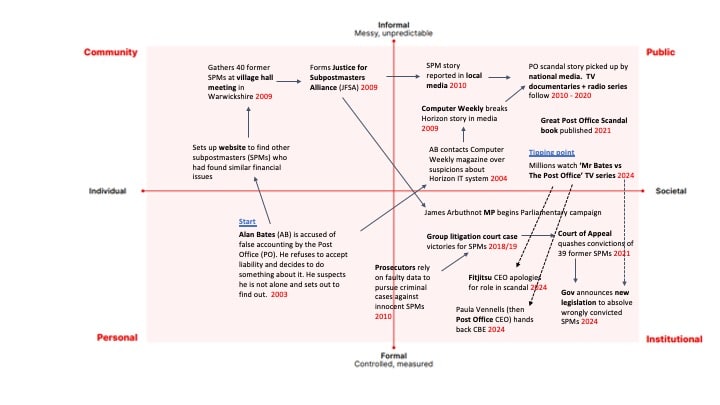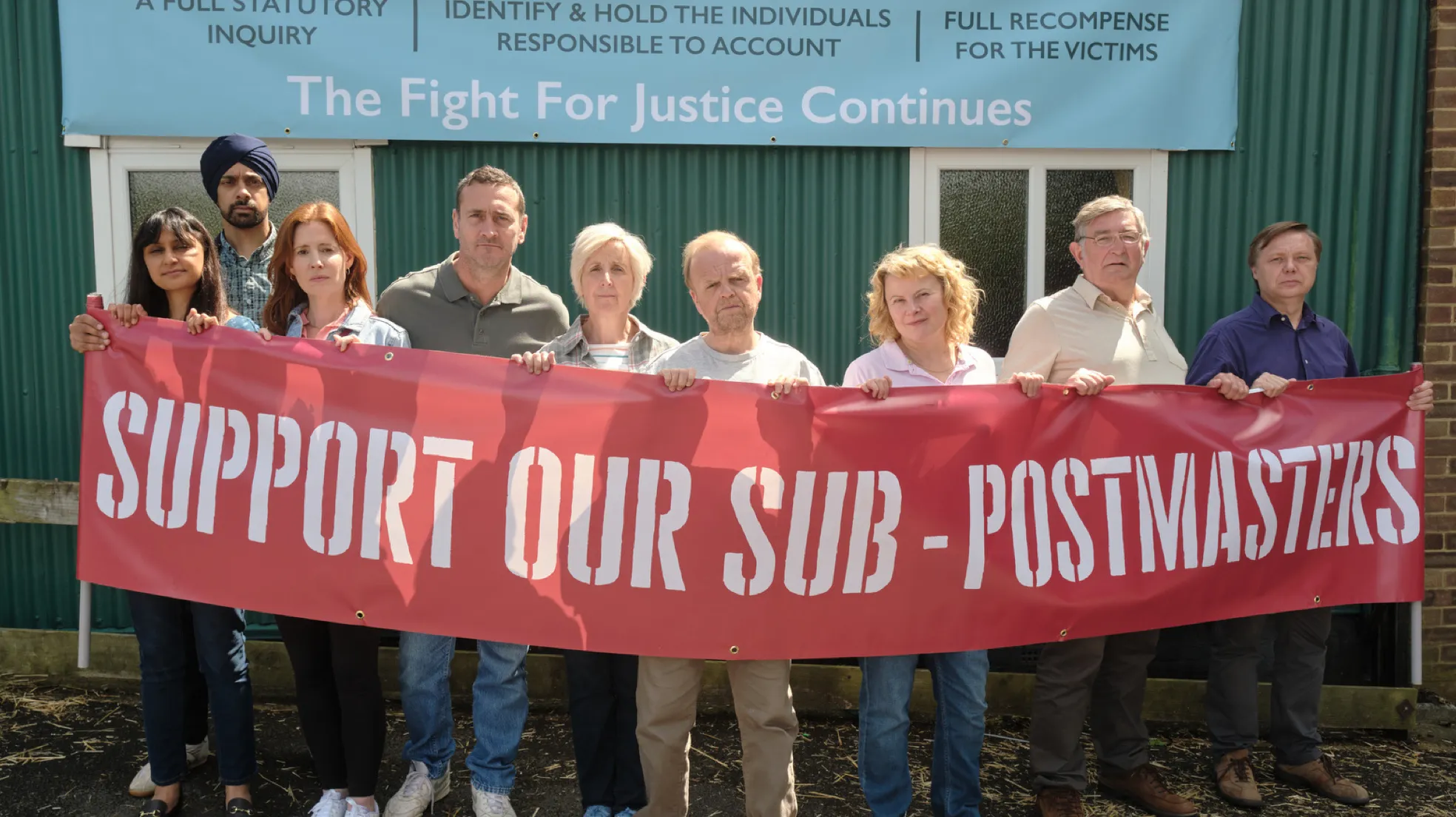
Mr Bates vs The Post Office: Why it takes an ecosystem of storytellers to unlock big change

- Written byFran Panetta
- Published date 29 January 2024

How can we make our stories stronger and more likely to succeed?
Last year I had only a vague idea about the “the Post Office scandal”. I couldn’t have given you the details. It was something about faulty software and Post Office mismanagement.
Cut to an evening in the first working week of 2024. It’s 10pm, I’m on my sofa, unable to tear myself away from ITV’s new drama Mr Bates vs. the Post Office. We’ve reached the end of the second episode and I’m pleading with my partner not to turn off the TV. Alan Bates has just had a call from the Post Office’s CEO Paula Vennells, who seems to be offering to work with the subpostmasters: “Where do we go from here? Should the two of us try and find a way forwards?” It must be a trick. I can’t stop now.
Forty-five minutes later and I still can’t switch off. A software engineer from Fujitsu has just dropped a bombshell: “They’re lying. They say there is no remote access… there was a whole room of people doing corrections while the subpostmasters slept.” I need to know if he’ll go public and support them. By now, I know exactly what Horizon was and the problems it caused. I know how appallingly the Post Office behaved. And I know how many lives were ruined — and ended. I’m hooked.
I emerged from Mr Bates vs The Post Office heartbroken and furious: at the Post Office, at the government, and at the criminal justice system. And I wasn’t the only one. To date, 16 million people have streamed the series on ITVX. Twenty-five years since Alan Bates started telling it, this story is dominating the national conversation at last.
For those of us who work in ‘impact storytelling’, Mr Bates vs. The Post Office stands as proof of our most fundamental convictions. That stories are how human beings understand our world. That they have the power to move people. That moving the public can lead to social change. That stories have the power to change the world.
It’s more than a conjecture. There is a growing body of evidence, spanning disciplines from neuroscience to anthropology to communications, which show that storytelling interventions have a measurable impact on people’s knowledge, attitudes, beliefs, values and behaviour.
However, it is usually nearly impossible to draw a direct line of causation or attribution between any individual storytelling intervention — from a TV drama or documentary to an exhibition or a longer-term campaign — and measurable change.
There are so many other contributing factors, it’s incredibly hard to prove causation. But the reality is that a direct line of attribution is often exactly what funders are looking for. As a colleague said to me this week, “evidence of direct policy impact is pretty much gold standard”.
But in the case of Mr Bates vs. The Post Office, we have that illusive evidence in spades. Since it aired, the government has announced a plan for sweeping new legislation to exonerate wrongly convicted subpostmasters and for “a new upfront payment of £75,000 for those affected”. Former CEO Paula Vennells has handed back her CBE. The Post Office now faces criminal investigation for fraud. Fujitsu’s global Chief Executive apologised publicly at Davos. And at a business and trade select committee last week, the company’s European Chief Executive committed to contribute to the compensation of victims.
The team at ITV and screenwriter Gwyneth Hughes deserve significant credit for these developments. Mr Bates vs. The Post Office is powered by a remarkable script, which uses proven storytelling techniques to convey both the factual detail and the emotional heft of this complex, 25-year case clearly and engagingly. In this case, we can draw a clear and direct line of causation from the extraordinary reach and impact of ITV’s free-to-view TV drama, and the rapid changes taking place in government, the courts, and in the lives of the wronged subpostmasters.
An ecosystem of campaigners and storytellers
But, as Hughes’ four episodes makes clear, this landmark new legislation is the product of over two decades of work by an expansive ecosystem of subpostmasters, organisers, journalists, campaigners, documentary makers, playwrights, lawyers and politicians. A single TV drama can help change the world. But it rarely does so alone.

Together with our friends at the Sheila McKechnie Foundation (SMK), our team set out to map that wider ecosystem of actors and interventions, to understand their 20-year journey to change.
For those of you now very familiar with the Post Office Horizon story, SMK’s social change grid should be pretty self-explanatory (it should also be apparent that we’ve had to truncate many of the activities, too).
To begin with, the subpostmasters were acting alone (Personal Quadrant). Alan Bates contacted his MP as soon as the Post Office terminated his contract in 2003. When nothing came of that, he wrote to Computer Weekly in 2004. All over the country, scores of subpostmasters who had suffered the same fate were doing the same thing: appealing to the Post Office, then to their MPs, then going to the media.
In 2009, Bates formed the campaign group the Justice for Subpostmasters Alliance (the Community Quadrant). Later that year, Computer Weekly published its first story on Horizon: the culmination of five years of reporting by Rebecca Thomson and colleagues (the Public Quadrant 3). Shortly thereafter, James Arbuthnot — whose constituent Jo Hamilton featured in Thomson’s article — began campaigning in parliament on behalf of the subpostmasters (Institutional Quadrant). By 2014, 144 MPs were working on behalf of subpostmaster constituents. By 2017, a group of 555 subpostmasters has launched legal action against the Post Office, and by 2019 a High Court judge ruled that shortfalls in Post Office branch accounts were caused by Horizon, securing a pay-out of £58m.
Being a Storytelling Institute, we’re particularly interested in the Public Quadrant. From the first Computer Weekly article published in 2009 to the ITV series in 2024, there have been trade pieces, local and national radio broadcasts, Private Eye investigations, a book, a play, three Panorama documentaries (2015, 2020 and 2022) and a staggering number of news reports: 383 from The Times, 343 from The Daily Mail, 234 from The Daily Telegraph, 152 from The Sunday Times, 127 from The Express, 101 from The Sun. These writers, journalists and storytellers helped enable the first legal actions, and build the public and political pressure required to secure the 2021 inquiry and Government commitments to compensation in 2023. Finally, drawing on a decade of storytelling, this ITV drama amplified this story of injustice to an almost unprecedented national audience — reaching the ‘tipping point’ for lasting change.
It wasn’t one story that sparked change. The policy and legislative wins of the last month are the product of an ecosystem of campaigners, organisers and storytellers — working together and in parallel over 21 years, in all four quadrants.
Throughout my career in media, documentaries and art, I have observed that all too often, storytellers think of the “impact” of our work in isolation from the activities around it. In broadcast we call the people we interview “contributors”, or when developing a documentary, we call it “casting”. The campaigners, MPs and lawyers give us what we needed for our stories: words to quote, footage for our montages, facts to report. In some ways that’s understandable. News and media views itself as objective. But it too rarely occurrs to us that we are actually embedded within an ecosysyem of change — less frequently still to ask what we could contribute to them.
The success of the subpostmasters is evidence that when campaigners and storytellers work together, we can have transformative impact.
The non-profit DocSociety recognsies the importance of building relationships like this between campaigners and makers of documentary film and factual drama. The charity Heard does incredible work connecting campaigners with creatives who can amplify their voices. But what we really need is a culture shift: for storytellers in all forms — artists, journalists, writers and filmmakers — to see themselves as part of the ecosystem for social change.
That’s increasingly the focus of our research and work at the AKO Storytelling Institute. We are, of course, fanatical about the need for brilliant storytelling skills — from writing and acting, to directing, as well as the need for core infrastructure like investment, expert impact production and marketing.
But what I increasingly want to ask impact-focused storytellers to consider is: how can we better work with other players in the ecosystem of change? How can we support activists, as well as letting them support our work, too? How will our intervention — our podcast, our play, our film — support the other work happening around us at the moment? How can we work in this ecosystem to make our stories stronger, and their work more likely to succeed?
I also want to ask campaigners to consider how drama, theatre, gaming or fiction might support their efforts. Campaigners have long seen journalists and news media as the mouth-piece to move the public and put pressure on institutions. But as our news and information systems fragment and silo, and trust in traditional media declines — so too does its power.
It can be a leap for storytellers to think of themselves in this way. Journalists in particular tend to view themselves as outside these campaigning systems. But if we are really committed to social justice work, to producing impact centred work, then we need to accept — and celebrate — our connection to movements and ecosystems bigger than ourselves. If we do, Mr Bates vs. the Post Office won’t be an outlier case study of unprecedented impact — but the start of a new wave of impact storytelling and social change.
The AKO Storytelling Institute is part of the Social Purpose Group at University of the Arts London, committed to the value of creativity to make the world a better place.
We will be holding a public event on 14 March 2023 about the ITV drama Mr Bates vs The Post Office and exploring in more depth how it had the impact it had, and what we can learn from this case study.
Please visit our website for more information on upcoming events.